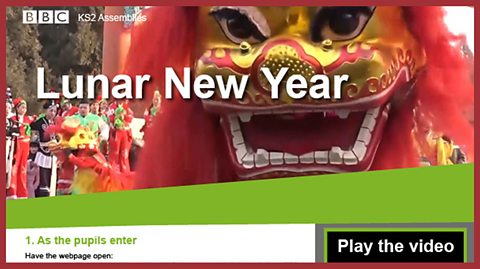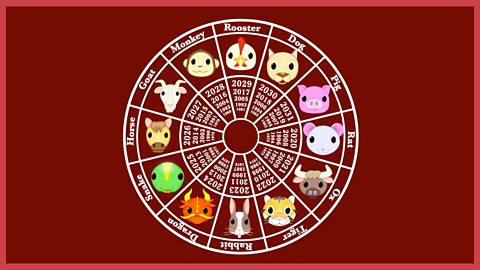In short...
Themes: Lunar New Year; spring festivals; celebrating with friends and family.
Summary: Lunar New Year (also known as Chinese New Year) marks the start of a new lunar year and falls in January / February. In 2024 Lunar New Year begins on 10 February. It is celebrated with gifts, fireworks and dragon and lion dances and culminates on the 15th day with a lantern festival. It is thought to be largest annual human migration as Chinese return home to spend time with their families. The festival is also celebrated in many other east Asian countries.
Resources: The . This assembly also includes an image of the ('Sheng Xiao' in Mandarin) to display.

The video
A young member of the Chinese community in the UK tells us about the festival of Lunar New Year (also known as Chinese New Year) and why she enjoys it so much…
The 15-day festival begins with spring cleaning: everyone joins in with cleaning the home ready for the New Year. The festival is celebrated with:
- new clothes
- gifts of money
- special food
- parades - including dragon and lion dances
- fireworks and beautiful lantern displays on the final day
Duration: 4' 06"
Final speech: 'Happy New Year!'
Video questions
- How is Lunar New Year different to the UK new year celebrations? (For example: it lasts for 15 days; the timing is based on a new moon)
- How is each of the Chinese years named? (After one of 12 animals, which rotate in sequence: Rat, Ox, Tiger, Rabbit, Dragon, Snake, Horse, Sheep, Monkey, Rooster, Dog and Pig)
- What do Chinese families do at Lunar New Year? (For example: clean their homes thoroughly; enjoy special food; buy new clothes; give gifts; take part in street parades; make lanterns)
- What colour has special importance for the Chinese at Lunar New Year? (Red - seen as lucky)
- What happens on the final night? (The lantern festival, known as 'Yuan Xiao')

Key links
Download / print the framework ready for use

Click to display the image of the zodiac full-size


Suggested framework
1. Entry
Music. An online search for traditional Chinese music will offer many possibilities.
2. Introduction
Tell the assembly that today they will be finding out about Lunar New Year, which is also known as Chinese New Year: how it is celebrated and how important it is to the Chinese community. Ask the pupils if they have ever heard of Lunar New Year or ever been to a Lunar New Year celebration? Gather feedback and if anyone has been to a celebration before you can ask them to share what it was like. Explain that they will now watch a short video about Lunar New Year and that you would like them to think about the differences between the Lunar New Year celebrations and the new year traditions held on 31st December. They should try to remember these special traditions and be ready to discuss them after the video.
3. The video
Play the video. The duration is 4' 06" and the final words are: 'Happy New Year!’
4. After the video
Ask the children to turn to the person sitting next to them and try to remember as many Lunar New Year traditions as they can from the video.
5. Time to talk
Start by asking the children: ‘Who would like to share something they found interesting about Lunar New Year from this video?’ [Gather responses.] Building on the comments, ask the whole group:
- ‘Can anyone tell us why the Lunar New Year is different to the UK New Year?’ (You are looking for awareness that it lasts for 15 days and knowledge of the lunar calendar).
- ‘Can anyone remember how each of the Chinese new years are named?’ (You are looking for an awareness of the 12 animals used to name each year). You can follow this up by asking: ‘Can anyone remember any of the 12 animals used to name the Chinese / Lunar New Year?’
- ‘Can anyone remember any of the traditions that families observe when preparing for Lunar New Year?’ (You are looking for awareness of family cleaning the house to get rid of the old and welcoming in the new and good luck for the year to come).
- 'Can anyone tell us what colour is important for the Chinese at Lunar New Year and what it means?’ (You are looking for awareness of the colour red and that is seen as a lucky colour and will bring good luck).
- ‘Can anyone remember what happens on the 15th night of Lunar New Year?’ (You are looking for awareness of the Lantern festival - Yuan Xiao - on the 15th night).
6. Opportunity to sing
An opportunity to sing your chosen song. Suggestions from ≥…»ÀøÏ ÷ collections below.
7. Opportunity to reflect
Focus your reflection on the theme of good luck, happiness and hope for the year to come. Ask the children to think carefully and close their eyes if they want to, while you say the following:Lunar New Year is about starting afresh and hoping for good things in the future for you and for your family and friends…
Think about anything that brings you good luck, happiness and hope for the future…
Sometimes things do not always go well…and we can feel unhappy…
But Lunar New Year reminds us that there is always an opportunity for a fresh start with lots of good things to come.
8. Opportunity for prayer
Begin with your usual form of address ('Dear God', 'Dear Lord', 'Let us pray', etc) and:
We want to thank you for the lessons we can learn from Lunar New Year…
About the importance of family, friends, community and happiness…
Help us to be hopeful for the future and to share happiness and hope to all around us.
Amen.

Suggested songs
Song: 'Back in school again' (All about our school, no 2. Vocal version)
We’re here starting the year,
Everybody back from their holiday.
New term, plenty to learn,
Everyone together again.
Back in school again,
Meeting all our friends,
Here with all of our teachers,
Every one of us
Makes a difference,
Let’s do the best that we can!
We’re all part of the school,
Everyone is very important, so
Who’s new? How do you do?
We’re so glad you’re joining us too.
Back in school again,
Meeting all our friends,
Here with all of our teachers,
Every one of us
Makes a difference
Let’s do the best that we can!
We’re here starting the year,
Everybody back from their holiday.
New term, plenty to learn,
Everyone together again.

